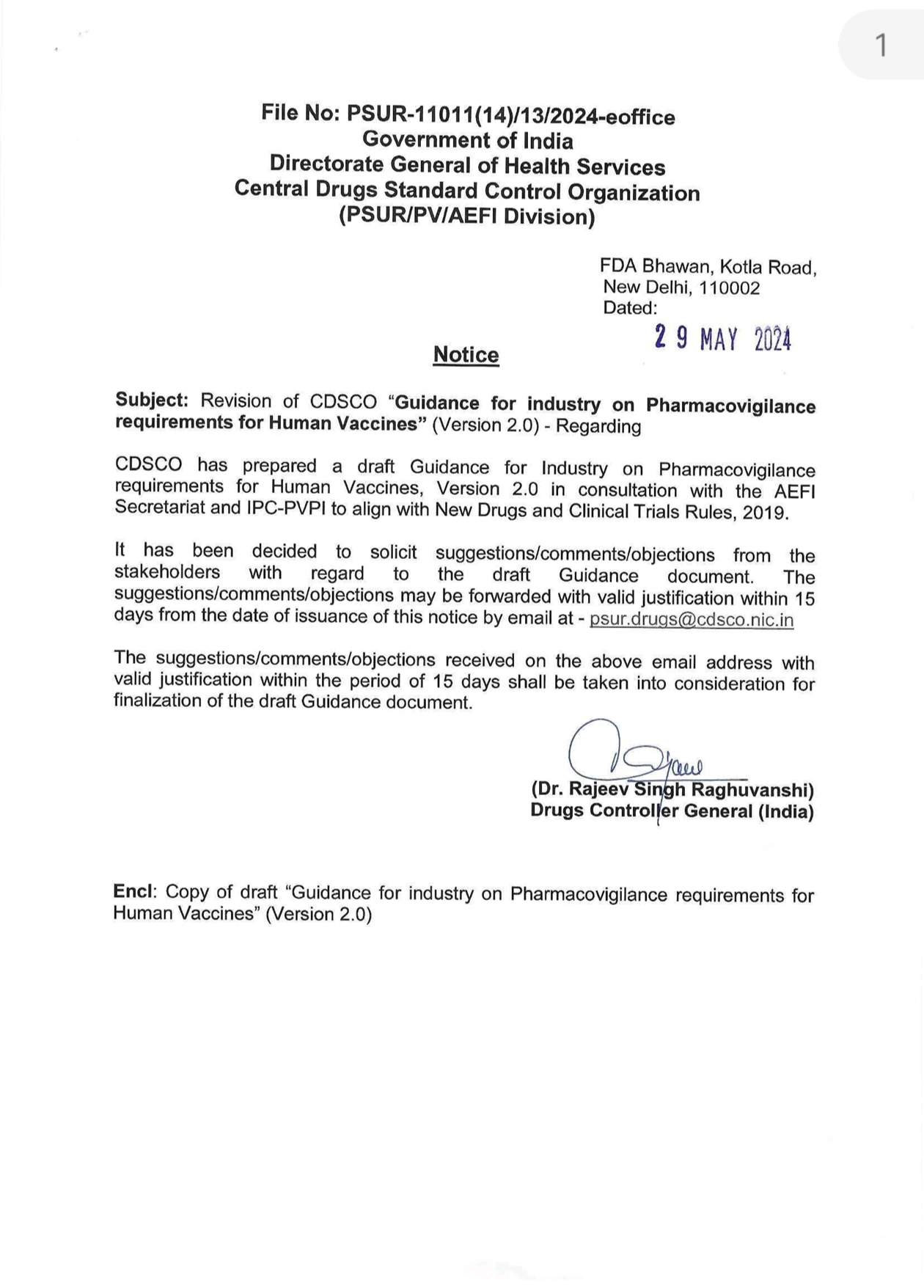New Delhi, June 2024 — The Central Drugs Standard Control Organization (CDSCO) has released a draft guidance document aimed at standardizing pharmacovigilance requirements for human vaccines in India. This guidance is part of an ongoing effort to enhance the safety and efficacy monitoring of vaccines, ensuring public health protection through robust regulatory frameworks.
Key Highlights of the Draft Guidance
- Objective and Scope: The draft guidance is designed to provide clear and detailed requirements for pharmacovigilance activities related to human vaccines. It covers the entire lifecycle of a vaccine, from clinical development to post-marketing surveillance. The document is intended for vaccine manufacturers, importers, and other stakeholders involved in vaccine pharmacovigilance.
- Adverse Event Reporting: The draft emphasizes the importance of timely and accurate reporting of adverse events following immunization (AEFIs). It outlines specific timelines for reporting serious and non-serious AEFIs, and the requirement for maintaining comprehensive records. This aims to improve the detection of potential safety issues and ensure swift regulatory action when necessary.
- Risk Management Plans (RMPs): Manufacturers are required to develop and implement risk management plans that identify, assess, and minimize risks associated with vaccine use. The guidance specifies the components of an RMP, including risk minimization measures and plans for ongoing safety monitoring.
- Periodic Safety Update Reports (PSURs): The draft mandates the submission of periodic safety update reports to CDSCO. These reports should include cumulative data on vaccine safety, benefit-risk evaluations, and updates on risk management activities. PSURs are crucial for continuous assessment of the vaccine’s safety profile in real-world use.
- Pharmacovigilance System Master File (PSMF): Companies must maintain a pharmacovigilance system master file, which provides a detailed description of the pharmacovigilance system in place. The PSMF should be readily available for review by CDSCO and include information on the organizational structure, procedures, and resources dedicated to pharmacovigilance activities.
- Training and Quality Management: The draft highlights the need for continuous training programs for personnel involved in pharmacovigilance. It also calls for the implementation of a quality management system to ensure compliance with pharmacovigilance requirements and to promote a culture of continuous improvement.
- Collaboration with International Bodies: Recognizing the global nature of vaccine development and distribution, the guidance encourages collaboration with international regulatory bodies and adherence to global pharmacovigilance standards. This will facilitate the exchange of safety information and harmonize pharmacovigilance practices.
Stakeholder Involvement and Public Consultation
CDSCO has invited comments and suggestions from stakeholders, including vaccine manufacturers, healthcare professionals, and public health organizations. The draft document is available on the CDSCO website, and stakeholders can submit their feedback within 60 days of its release. This consultation process aims to ensure that the final guidance is comprehensive and reflects the views and experiences of all relevant parties.
Implications for Vaccine Safety and Public Health
The implementation of this guidance is expected to significantly enhance the pharmacovigilance landscape for vaccines in India. By establishing clear and stringent requirements, CDSCO aims to improve the detection and management of vaccine-related risks, thereby increasing public confidence in immunization programs. The proactive approach to monitoring and managing vaccine safety will contribute to the overall success of vaccination campaigns and the control of vaccine-preventable diseases.
Conclusion
The CDSCO’s draft guidance on pharmacovigilance requirements for human vaccines represents a major step forward in ensuring the safety and efficacy of vaccines in India. By aligning with international best practices and fostering a culture of rigorous safety monitoring, the guidance will play a crucial role in protecting public health and maintaining trust in vaccines as a vital tool in disease prevention. Stakeholders are encouraged to participate in the consultation process to help shape the final document and ensure it meets the highest standards of pharmacovigilance.
Draft Guidance on Pharmacovigilance Requirements for Human Vaccines – Download
